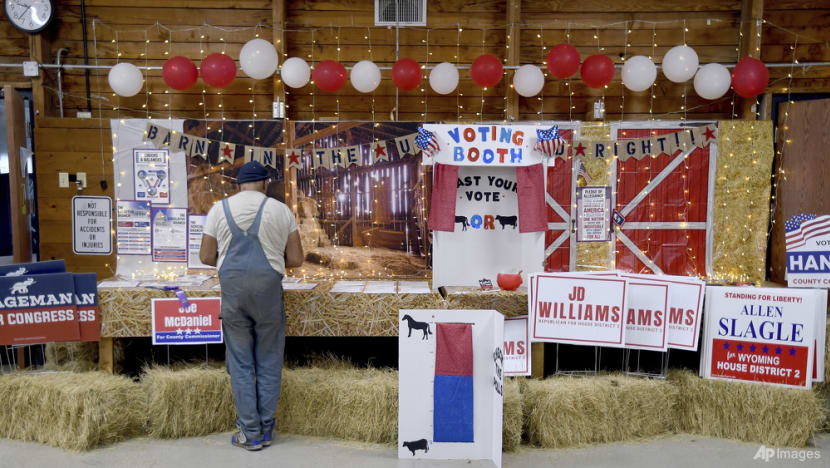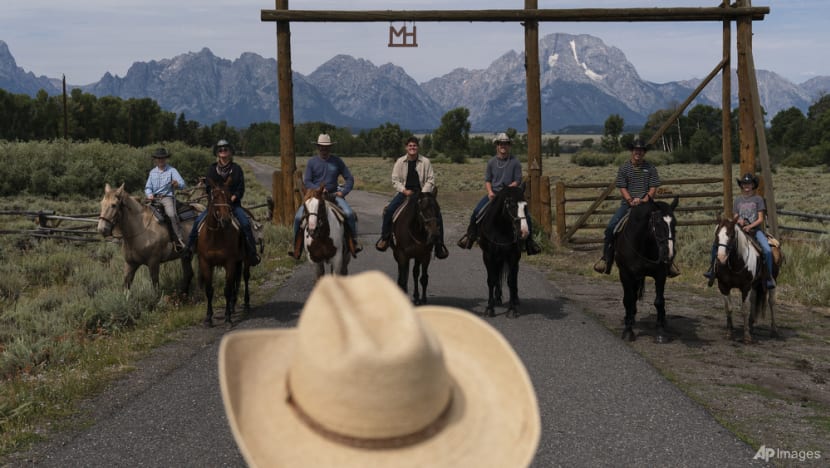As US presidential election nears, tensions rise in divided states amid voter demographic shift
Idaho and Wyoming, which share a border, are among the most Republican states in America.

Pat Jordan, a registered Republican who describes himself as a progressive, looks at a get-out-the-vote display at the Niobrara County Fair in Lusk, Wyo., on July 31, 2024. (AP Photo/Thomas Peipert)

This audio is generated by an AI tool.
WYOMING/IDAHO: Longtime Wyoming resident Rebecca Bextel was among 70 per cent of voters in her state who voted for Donald Trump in the 2020 presidential election.
Wyoming is the reddest American state, with a larger share of Republican voters than anywhere else.
The Democrats have traditionally had little hope of turning it blue. Now, the western state faces rising tensions as more Democrats move in and slowly change long-standing voting patterns and traditions.
Bextel, who is now running for the position of Wyoming GOP chair, is among those who feel her state’s way of life is under threat from this shift in demographics.
Extremely wealthy people from places like California and Chicago move to Wyoming and end up retiring there, she said.
“When they get here, they vote … the same horrible politicians into office here as the places they just fled, because they have high crime, high taxes, rampant illegal immigration and crime.”
This influx of new residents has seen housing prices skyrocket, with an average single-family home in Jackson town now topping US$7 million, according to The Viehman Group’s semi-annual The Jackson Hole Report.
DEMOCRAT NUMBERS FALLING IN RURAL AREAS
Wyoming, the least populated US state with a total of just about 600,000 people, is best known for its majestic mountain ranges and pristine wilderness.
The Republican stronghold there is symptomatic of a larger problem for the Democratic Party, which is seeing declining numbers in some of the most rural parts of the United States.
This dominance could become even stronger after the state passed a law earlier this year that makes it tougher to switch party affiliation.
In some Wyoming counties, Democrats account for fewer than 3 per cent of voters. In next week’s presidential election, the number of Democrats running for local government roles has reached a nearly 30-year low.
But Teton County is one of only two places in the state that is bucking the trend.
During the COVID-19 pandemic, it became a haven for those working remotely who were attracted by the green scenery and some of the lowest taxes nationwide.

The county is represented by Natalia Duncan Macker, a rare elected Democrat in the state who originally hails from Tennessee. She is now running for re-election as county commissioner.
“Certainly, some of the policies that I would like to see passed - like stronger support for early childhood education and childcare, paid family leave, addressing the gender wage gap - might be easier somewhere else. But I always love a good challenge,” she said.
“And I love where I live, and love our community and love the people in our state, so I want to work hard. And I do think that we have more in common than not.”
Philip Wilson, who owns a rodeo in Teton County, pointed out that years ago, there was no chance for anyone other than a Republican to get elected.
Although he feels it is now the other way around, he said: “When it comes to changing the values that I have, and the older people in this community, we’re pretty set in our ways.”
The lifelong Republican and avid hunter has lived in Wyoming his whole life. His great-grandparents were among the first white settlers in the state in the late 1800s.
Those like him and Bextel have now settled into an uneasy partnership with Democrats. When asked how it is like living among so many from the opposing party, Bextel said she holds her own and proclaimed her pride at being a Republican.
“I have a Trump sign in my yard so it’s easy to know where I live in east Jackson. I’m very proud of what I believe, and I believe that President Trump is going to save this country.”
REPUBLICANS MOVING TO IDAHO
Meanwhile, another state where the most Republican counties have been concentrated in recent years is Idaho, which borders Wyoming in the southeast.
In 2020, more than two-thirds of Idaho residents voted for Trump.
Nearly 50 per cent of newcomers to the state in the last 15 years have been Republican, with the figure rising 11 per cent in just the last two years.
Many, including Greg and Lorri Owens who moved from Washington to Idaho in March, have been drawn by the conservative local government and lower taxes.
They said that during their 25 years living near Seattle, crime rose while their community declined.
“The environment changed. It went more from a conservative little city to a lot of people moving in from different states, bringing politics which we didn’t enjoy, which increased taxes,” said Greg Owens.
That changed when they took the plunge and moved to Idaho.
“They’ll be right upfront and ask you what’s your political affiliation, right out of the blue, and you’re like ‘oh, that’s different’. Because that’s a no-no in Washington,” he added.
TENSIONS OVER HARDER-LINE ISSUES
But not everyone in Idaho is happy with the influx of Republicans.
On the streets of state capital city Boise, where Democrats outnumber Republicans, some – such as Idaho Senator and Democrat Melissa Wintrow – told CNA that Republicans’ views trouble them and are pushing Idaho further to the right.
These include harder-line opinions on issues like abortion access, gay rights, and education.
“What I’m afraid of is, with this extreme ideologue, people are moving here because of a perceived ideologue, a perceived political bent,” said Wintrow.
“But really what’s happening is that the majority of Idahoans, that are traditional Republicans who live here, aren’t taking kindly to it.”
Nevertheless, with Idaho being the second-fastest growing state after Utah, real estate agents have been selling Idaho as the place for conservatives to move to if they are looking for others who share their political and ideological viewpoint.
This includes Conservative Move, an organisation of property agents that help people move across state lines to places with conservative values.
“People are conservative-minded, and there are a lot of us who have transplanted here, who felt like they were being pushed out of their state, versus us looking to leave. And that’s what I hear more and more from those who are making inquiries,” said realtors Jason and Kelli Krafsy from Conservative Move.
“They just feel like they don’t fit in their state anymore - and it’s not because they changed. The state changed.”















